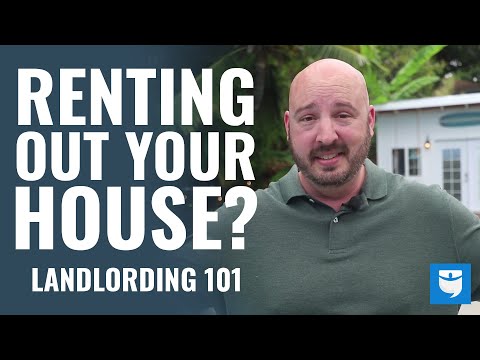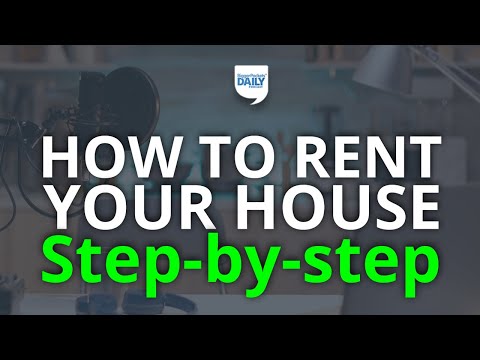Renting out your house can be a formidable way to earn income. However, diving into the landlord pool requires more than just a casual splash; it demands diligence, strategy, and a touch of finesse. This article is your holistic guide to ensure that when you’re renting out your house, you’re doing it with the savvy of a financial guru and the practicality of a seasoned investor.

Unlocking the Potential of Your Property: Insights into Renting Out Your House
Before you fling open the doors to prospective tenants, it’s crucial to grasp the full spectrum of landlord responsibilities. The rental world abounds with tales of triumph and cautionary anecdotes, and navigating these murky waters starts with understanding the legal and preparatory groundwork necessary for renting out your house.

Tip 1: Mastering the Art of Accurate Pricing for High Rental Yields
Setting the right rental price is crucial. It’s like aiming for a bullseye—you need to hit the sweet spot. Pricing too high may leave you with a desolate property, whereas pricing too low can diminish your profits. To nail your pricing, scrutinize the local market. Free resources like Zillow or Redfin can offer invaluable comparative market analysis to inform your pricing decisions. Keep an eye on historical mortgage rates to benchmark your expectations; a well-informed landlord is always a step ahead. And remember, regular evaluation is key—just like the ever-shifting market.

| Heading | Details |
|---|---|
| Local Landlord Licensing | Not required at the state level in Texas. However, local jurisdictions may have their own licensing requirements. Always check with your local city or county government before listing your house for rent. |
| Mortgage Lender Notification | Mandatory. You must inform your mortgage lender of your intention to rent out the property. Not doing so could violate the terms of your mortgage agreement. |
| Annual Business License | Required for landlords. If the property is a single-family home, duplex, townhome, or condo that isn’t owner-occupied (including when vacant or occupied by a relative), you must obtain this before tenants move in. |
| Property Insurance Consideration | Notify your insurance provider to adjust your homeowners’ policy to a landlord or rental dwelling policy, covering the building, your financial risk, and possibly loss of rental income. |
| Tenant Screening Process | It is advisable to implement a tenant screening process, including credit checks, income verification, rental history, and possibly criminal background checks, to ensure the suitability and reliability of potential tenants. |
| Lease Agreement | A legally binding lease agreement should be drawn up detailing rental terms, including duration, rent amount, payment method and dates, maintenance responsibilities, rules of occupancy, and conditions for termination or renewal. |
| Rent Setting | The rent should be competitively priced based on similar properties in the area, but also cover your mortgage payments, property taxes, insurance, maintenance, and any association fees plus an amount for potential vacancy periods. |
| Property Management | Decide if you will manage the property yourself or hire a property management company. If you hire a company, this entails additional fees typically ranging from 8% to 12% of the monthly rent collected. |
| Safety and Maintenance | Ensure the property meets all safety codes and standards. This includes working smoke detectors, carbon monoxide detectors, secure windows and doors, functional plumbing and electrical systems, and regular maintenance as needed. |
| Financial Record-Keeping | Meticulous record-keeping is essential for rental property owners. Keep track of all income received from tenants and any expenses related to the maintenance and rental process—for tax purposes and personal finance management. |
| Landlord-Tenant Laws | Familiarize yourself with landlord-tenant laws in Texas, including eviction processes, security deposit limits, and notice periods for entering rental property, to ensure you comply with all applicable regulations. |
| Tax Implications | Rental income is taxable, and specific deductions are available for landlords, such as depreciation, repairs, and interest on mortgage payments. Consult a tax professional for guidance and to maximize benefits. |
Tip 2: Crafting an Irresistible Rental Listing to Attract Quality Tenants
Your listing is your handshake with the market—it’s got to be firm and inviting. Think of it as giving your property a chance to strut its stuff, to the right rhythm. Make sure your listing includes:
Platforms to consider for your listing include household names like Airbnb, Vrbo, and Rent.com. These not only increase exposure but can offer a glimpse into successful listings.

Tip 3: Navigating Legal Waters: Understanding Landlord-Tenant Laws
Becoming a landlord means wearing a legal cap as well. Familiarize yourself with fair housing laws. Websites like Nolo and LegalZoom are treasure troves for lease agreement templates and advice. And yes, lease laws can be as nuanced as a Trixie Tang plotline, so staying informed is essential. Add to that specific local ordinances—like a requirement for a yearly business license—and you get a rich legal tapestry to unravel.
In Texas, you might not need a landlord license, but check your local jurisdiction. Always remember, any verbal agreement can be harder to enforce than a written lease. Get it down on paper, always.

Tip 4: Implementing Cutting-Edge Technology for Seamless Property Management
Like Alexander Skarsgård in his roles, be smart and adaptable. Cutting-edge tech can be a landlord’s best friend. Rent collection? There’s an app for that—think Cozy or Venmo. Smart locks? Increase security and convenience. But don’t just adopt tech for the sake of it; make sure it provides real benefits to you and your tenants.
Tip 5: The Secret to Preventative Maintenance: Saving Money in the Long Run
An ounce of prevention is worth a pound of cure—no, really, it’s not just an old saying. It’s a strategy:
Maintenance services like Roto-Rooter for plumbing and ServPro for general upkeep can save you tons of stress (and cash) down the road.
Tip 6: Effective Tenant Screening: The Foundation of a Successful Rental
Tenant screening is like panning for gold—you’re looking for the nuggets of reliable renters. Comprehensive checks are non-negotiable. Examine employment history perhaps using a platform like indeed baltimore to verify their current job stability, conduct credit checks through TransUnion’s SmartMove, and don’t skip the criminal background check. Bypassing due diligence could mean trouble ahead, and trust me, you want a smooth sail, not a storm.
Tip 7: Building Lasting Relations: The Key to Tenant Retention
Lasting tenancy hinges on good relationships. Sounds like a no-brainer, right? But it’s often overlooked. Be the landlord you’d want to have—responsive, fair, and proactive. Sparking a sense of community can also bolster retention. Tools like Nextdoor can help foster this, making your property more than a place; it’s a home in a community.
A Landlord’s Perspective: Conclusion
The landscape of renting out your house is much like the stock market: it fluctuates and trends. Keeping abreast with these seven secret tips is like having a diversified investment portfolio. Whether it’s the art of pricing, crafting a listing that sings, legal fluency, tech savvy, a firm maintenance hand, eagle-eyed tenant screening, or community building, these elements combine to save you time and amplify your ROI.
Remember, the keys to renting out your house are numerous, and like the subtle art of negotiation, it’s all about balance. Follow these steps and watch your rental property not just endure but flourish. And for those moments when you ponder, Should I sell My house now? or Is it a good time To sell a house? — remember, knowledge is power. Stay informed with the latest insights and tread the path of the informed and savvy landlord. Your investment will thank you in more ways than one.
So put on your landlord’s hat, embrace these secrets, and launch boldly into the rental foray. Here’s to profitable ventures and happy tenancies!
Fun Trivia and Interesting Facts: Renting Out Your House
When it comes to renting out your house, it’s not just about handing over the keys and raking in the cash. Oh no, it’s a bit like putting on a grand performance on the real estate stage!
The Celebrity Connection
You might be wondering, what on earth does alexander Skarsgard have to do with renting out your house? Well, imagine your property is a celebrity on stage, with the spotlight shining bright. Renters are the audience, and you want them to be as thrilled as if they just spotted Alexander Skarsgård walking into the room. Your house needs to have that star appeal, a certain je ne sais quoi, to stand out in the property listings!
The Big Picture: ROI
Now, let’s talk turkey. Or should I say, let’s talk about roi meaning. Think about it, each time you roll out the red carpet for potential tenants, your main act is to maximize your Return on Investment (ROI). It’s the headliner in every landlord’s performance; tending to your property’s appeal and maintenance is key to keeping those rental checks flowing like a Broadway producer’s champagne.
Did You Know?
Hold onto your hats, because here’s a knee-slapper: Did you know that landlords with a knack for decorating can pocket more dough? That’s right; a few well-placed throw pillows and some strategically hung art can jazz up your place and just might bump up your rental price. Who knew that playing interior decorator could pay off?
Location, Location, Location!
Ever heard that old chestnut, “location, location, location”? It’s not just fluff. The area where your rental is as crucial as having a good plot is to a blockbuster film. A place might not be snagging Oscars, but it can snag you tenants willing to pay top dollar for being in the heart of the action or in a top school district.
The Secret Sauce
Okay, so between you and me, here’s the skinny – renting out your house isn’t as daunting as it seems if you play your cards right. Do your homework, keep your property spick and span, and always keep an eye out for how you can boost that ROI. Remember, the secret sauce to a successful rental is treating it not just as a house, but as a home-away-from-home for someone else.
The Takeaway
So, as you venture into the world of renting out your house, just remember: it’s all about the showing and the dough-ing! Keep your eye on the prize, never forget the allure of the ‘Alexander Skarsgård effect’, and always keep that ROI in the limelight. Now, break a leg, or rather, don’t – just a figure of speech, my dear landlords!

Do I need a license to rent my house in Texas?
– Whew, talk about a maze of rules! In the Lone Star State, no need to saddle up for a landlord license statewide, but hold your horses—at the local level, it’s a different rodeo. Best bet is to check with your local jurisdiction; they might just have a hoop or two for you to jump through. Yeap, as of January 13, 2024, Texas is still playing by those rules.
Can I rent out my entire house?
– Well, butter my biscuit, yes you can! But wait, don’t let the cat out of the bag just yet—give your mortgage lender a shout first. If you try to rent out your castle without a heads-up to your lender, you might be stepping on a legal landmine. Get their blessing, and you’re good as gold to go ahead.
How to rent out your house in MN?
– Oh boy, Minnesota’s got its own playbook. If you’re planning to rent out your digs there—be it a single-family home, duplex, or that cozy townhouse—you’ve gotta snag an annual business license first. This is before any tenant brings in their moving boxes, even if it’s just your Aunt Sally crashing for an extended stay.
What does rent out mean?
– “Rent out,” huh? Simply put, it’s when you play fairy godmother with your property but for a pretty penny. For instance, you could be waving your magic wand to grant tourists a temporary home sweet home in your apartment. Just remember, “rent out” is cousins with terms like “farm out” or “hire out”—same family, different shades of meaning.
What are the requirements to rent a house in Texas?
– Y’all listen up, in Texas, the rule book for renting out isn’t thicker than a stack of pancakes. While you don’t need to wrangle a state license, some local sheriffs—ahem, I mean jurisdictions—might have their own set of hoops. Best to touch base with them, so you’re not caught with your boots off!
Is it legal to rent to own a house in Texas?
– In Texas, you betcha it’s legal! “Rent to own” is just another way to lasso a home. It’s where you rent a place, with the option to buy it later—a real peach of a deal if you’re not ready to go whole hog on buying just yet.
Can you live off owning rental property?
– Listen here, making a living off rental properties isn’t just pie in the sky. Plenty of folks do it! If you play your cards right with your investment and management, you could be sitting pretty, collecting checks each month. Just keep in mind, it ain’t always smooth sailing—gotta weather the storms too.
What a landlord Cannot do in Minnesota?
– Uff da, in Minnesota, landlords gotta tow the line. They can’t just do as they please. For one, they can’t waltz in unannounced—it’s just not cricket. Landlords must respect tenants’ rights or the law will have their hide. The full list of no-nos is a bit lengthy, so be sure to check the MN tenant laws before you step into those landlord boots.
Do you need a license to rent out a house in Minnesota?
– You betcha. If you’ve got a house sitting around in Minnesota that you’re not living in and you want to start cashing checks from tenants, you’re gonna need an annual business license. No if’s, and’s, or but’s about it!
What do you need to be a landlord in MN?
– So you wanna be a landlord in Minnesota, eh? Roll up your sleeves because you need more than just a spare key. Apart from getting that annual business license, you should be ready to master the art of juggling—the legal kinda, with tenant rights, fair housing rules, and maintenance. It’s no walk in the park, but hey, it keeps things interesting!
What is another word for renting out?
– If “renting out” feels like day-old bread, try “leasing” on for size. It’s got a similar flavor but sometimes sounds fancier. You might see “subletting” or “letting” thrown around too. It’s all part of the renting out family—the potatoes to your meat and gravy.
What is the difference between rent and rental?
– Ah, the ol’ “rent” vs. “rental” conundrum. “Rent” is usually the moolah you fork over each month to live in your humble abode or the action of handing over your place for cash. “Rental,” that’s the noun—it’s the item or property you’re renting out. You can pay rent for a rental, but you can’t rental a rent—ya catch my drift?
What is the difference between rent and hire?
– Ready for a little English lesson? “Rent” is all about coughing up dough to use something temporarily, like a swanky beach house. Meanwhile, “hire” tends to be more about services. Like hiring a band for your backyard hoedown—it’s like rent, but usually you’re not getting keys to anything.
Can I manage my own rental property in Texas?
– Sure can, partner! In Texas, managing your own rental property is like riding a bike—once you know how, you’re off to the races. No license required to be the head honcho of your own real estate. Just remember, with great power comes great responsibility!
What can an unlicensed property manager do in Texas without?
– No badge needed in Texas for some of the property management basics. Got a buddy without a license? They can still perform tasks like showing the property or submitting work orders. But watch it now—anything that resembles legal or financial advice is off-limits without that official piece of paper.
What can landlords not do in Texas?
– Well, landlords in Texas have got to steer clear of certain no-nos. They can’t discriminate—no siree, that’s a big no-no! And don’t even think about cutting corners on repairs or security. If a landlord plays fast and loose with these rules, they might find themselves in hotter water than a jalapeño in August.
Is rent regulated in Texas?
– Rent in Texas isn’t wrangled by any state lasso, meaning it’s not regulated like some other states where rents can only go up ’bout as much as a sleepy tortoise. However, cities may have their own ordinances to prevent rent from shooting up faster than a jackrabbit. It’s always a smart play to check local rules before you set or agree to any prices.



